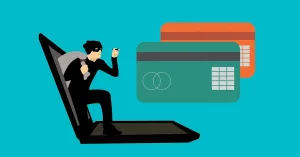Using the internet is not only an enjoyable past-time, but a necessity for remote workers, business owners, and those who need to keep connected to loved ones across the world. If you’re active online, more of your data is being collected than ever before. Companies can find out your name, age, location, workplace, and interests based only on your activity on their site and your cookies.
Thankfully, data protection laws mean companies are greatly restricted in what they can do with this data. However, if you make some of this information available, on social media for example, or if one of these companies suffers a data breach, you can turn into an easy target for scammers using advanced fraud tactics.
In 2021, the FTC reported that it had received over 2.8 million fraud reports, with consumers losing up to $5.8 billion. In this article, we’re going to explore what the most common types of online fraud are, as well as how you can best protect your identity when using the internet, so you don’t become part of these statistics.
The Basics of Online Fraud
What is online fraud?
Fraud is any attempt to solicit money, goods, or gain from individuals or organizations by using deception. Online fraud then, is a fraud that is committed using various means of connecting with people on the internet.
Why do fraudsters use the internet?
Arguably, with how simple it is for anyone to construct an entirely false identity online, as well as the sheer amount of information we share about ourselves publicly, the internet has made committing fraud easier than ever.
Why is your online identity valuable to fraudsters?
Sometimes, fraud will result in scammers gaining access to your online accounts or email address, which they will then use to scam others who trust you. This identity theft is a huge concern online because it can result in you losing important documents and data, as well as your reputation, and the (sometimes very large sums of) money needed to reclaim your identity.
The Warning Signs of Advanced Online Fraud
Below are some tactics that online fraudsters employ to get your details or money. Familiarising yourself with these warning signs will help you spot scams from the moment fraudsters make contact.
Creation of Urgency -Fraudsters need to push you into a corner, to get you to give them what they want as quickly as possible. Emotional manipulation and social engineering are frequently employed by scammers. Any legitimate business or contact will understand that you need to take your time if payment is concerned.
Too Good to be True - One of the early warning signs of fraud is being offered a prize or price that is irresistible. Fraudsters know that if they offer you something you want, you’ll be much more likely to fall into their trap. The same goes for an overwhelming amount of positive reviews on a site’s products or services. Remember, if something seems too good to be true, that’s probably because it is.
Cash in Gift Cards - Any cash transactions you make can often be traced and recalled by your bank. This is why fraudsters who are attempting to solicit payment from you will often ask you to send it to them in gift cards. As soon as someone asks you to send payment through gift cards, cease all communication.
Links in Emails - Many fraud attempts will originate in your email inbox. Any email that requires you to click on a link should be regarded with suspicion. It may seem harmless, but sometimes a single click can give away very personal information about yourself. Only open links or attachments from senders whom you trust, and block any that you don’t recognize.
What Are Some Advanced Fraud Tactics?
One of the easiest ways to protect yourself from online fraud is to familiarise yourself with the most common scams that individuals fall victim to. Below we’ve listed the 5 most reported frauds in the US, as well as how you can spot and stop them.
- Imposter Scams
These fraud attempts involve a scammer taking on a false identity, chosen specifically to make you more likely to trust them and give them what they want. For example, a common imposter scam involves receiving a distressing phone call or email from a long-lost family member who has found themselves in an emergency, that will only be solved if you pay up.
You should be wary of any correspondence from people who you don’t immediately recognize. If this is truly someone close to you asking for help, they will be willing to wait while you double-check the information provided.
- Job Opportunity Scams
These fraud attempts target those of us who are looking for employment, by advertising ‘dream’ jobs, usually on job boards and listing sites. By hosting a fake interview, the fraudsters gain a lot of valuable information on your identity that they can use against you in the future.
Be sure to scrutinize any information about the company and interviewer you are provided with, and be wary about any interview that is conducted remotely, over instant messenger, or through phone calls.
- Shopping Scams
Fraudsters who use online shopping scams will create fake stores, filled with products at discounted prices, and often with a whole host of 5-star reviews. It can seem even more legitimate if you have visited a fake store through a social media ad. By purchasing from these fraudulent stores, you give away not only your money but incredibly important information such as your card details.
Use third-party sites such as Trustpilot to check independent reviews on any store you have concerns about. You should also make sure that the URL for the site begins with ‘HTTPS’, as these sites will encrypt any data you give to them. Finally, if you do choose to purchase from an online store you’re a little skeptical of, be sure to use a payment method with consumer protection.
- Sweepstakes and Lottery Scams
Have you ever visited a site and received a pop-up telling you that you’ve won a new iPhone? Then you’ve come across this type of fraud before. By informing you that you’ve won a prize, these fraud attempts draw you in with the promise of something valuable. However, it turns out that you can only claim your prize by giving away your details, or even by paying a deposit.
You should ignore any prize for a competition that you have not entered. This goes for pop-ups on sites and emails. To add to this, any lottery that requires you to pay out for the prize is almost always illegitimate.
- Technology Support Scams
These frauds originate with a pop-up, email, or call informing you that a virus or fault has been found on your device. The scammer may try and impersonate someone from your device’s manufacturer to come across as trustworthy. Then they’ll ask you to download some software that will allow them to fix the issue, but in reality, they will take control of your device and have access to everything stored on it.
Your device’s manufacturer will rarely if ever, reach out to you first if there is an issue with your device. If you do receive correspondence of this kind, do not give out any information, and instead reach out to your chosen tech support using official emails and phone numbers found on their website.
Determining Your Online Identity
To best protect yourself from fraud on the internet, you should know when and where you have and are currently sharing information about yourself online. Once you’ve got a hand on these sites, you’ll be far better equipped to protect your online identity.
Most websites will have access to your IP address, which can also give them your location, as well as details about the device and browser you’re using. To protect this information, a paid VPN is a useful tool.
Any site on which you have an account has access to your email, so it can be worth trawling through them and deleting your accounts on sites you no longer use. On top of this, there are services you can use that will identify which of your accounts may have been compromised. Once you know this, you can change your password.
As for social media, putting your accounts private or limiting the people who can view your profile will protect any personal information you decide to share. Moving back to basics, you should never share your address, current location, contact details, or place of work on your social media.
How to Protect Your Online Identity
Protecting yourself from fraud attempts online isn’t a difficult or time-consuming undertaking. In fact, with a few simple tweaks in your behavior, you can ensure that online fraudsters will not be able to find out enough about you to initiate a scam.
- Use different usernames and passwords for each account
If you use the same password across a range of websites, once fraudsters have access to this password, all of these accounts are compromised. It can get tricky to remember such a range of passwords, so be sure to utilize a password manager to keep them stored and safe. This trick also means it’ll be much harder for fraudsters to track you between sites.
- Change passwords regularly
Even if you’re using different passwords for each site, one can still become compromised through data leaks. This is why it’s important to change your passwords for your most regularly used accounts at least every 3 months.
- Use a different email for work and personal correspondence
Access to your email can give fraudsters a huge amount of information on your identity, as well as allow them to use your identity to scam those in your contacts list. A useful tactic to limit the sites that have access to your email is to use different addresses depending on what you’re signing up for. For any important correspondence, a separate email address with a strong password that is regularly changed will help protect your online identity.
- Keep any device software up to date
Using out-of-date software opens your device up to attacks from those looking to commit fraud. Completing software updates as and when they become available will help protect your devices with the latest anti-virus from your device’s manufacturer.
- Block suspicious emails or accounts
Any account or email address that you don’t recognize that reaches out to you should be regarded as suspicious. For the best protection, block these contacts and accounts straight away. Most email servers will have an automatic spam filter, but if one of these fraudulent emails does make its way into your inbox, avoid any links and block the sender.
Sources
https://www.experian.com/blogs/ask-experian/most-common-types-of-fraud/
https://www.arborfcu.org/blog/10-warning-signs-its-fraud
https://www.esafety.gov.au/young-people/protecting-your-identity
https://www.globalsign.com/en/blog/what-data-is-collected-about-you-online
https://www.pewresearch.org/internet/2015/05/20/americans-views-about-data-collection-and-security/
https://www.met.police.uk/advice/advice-and-information/fa/fraud/online-fraud/cyber-crime-fraud/





















Add comment